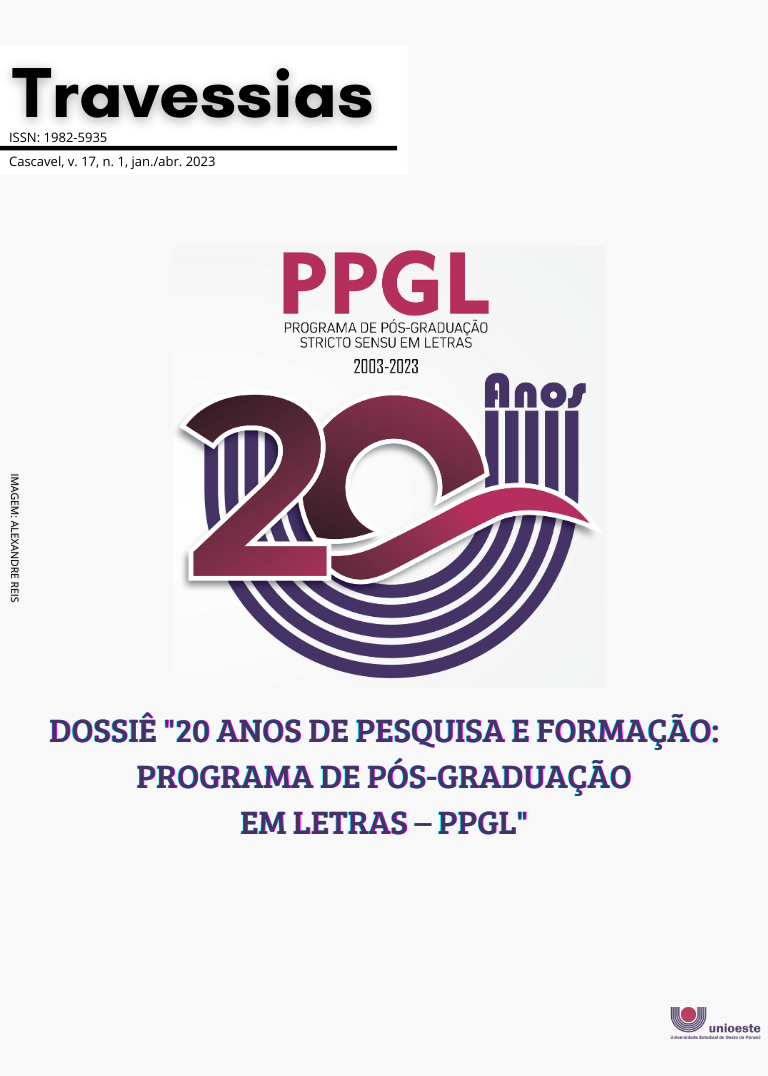“The Sandman” by E.T.A. Hoffmann
the uncanny as an aesthetic category
DOI:
https://doi.org/10.48075/rt.v17i1.30544Keywords:
Uncanny, E.T.A. Hoffmann, German romanticism, Sigmund FreudAbstract
This article has the aim of recognizing the motif of the uncanny as a fundamental esthetic category in the romantic movement, especially in “The Sandman” by E.T.A. Hoffmann (1776-1822). The central hypothesis of this work is that the phenomenon of the uncanny, as dealt with in readings of Hoffmann’s text, has been interpreted in a restrictive way by the psychoanalytical tradition. To this end, firstly a tentative characterization of the uncanny as an aesthetic category is proposed; then a general view of this motif in the story “The Sandman” will be presented; in the third part, the psychoanalytic interpretation of the uncanny by Sigmund Freud (1856-1939) in contrast with that proposed by Ernst Jentsch (1867-1919) will be presented; and lastly the task of a poetry of the uncanny will be tackled. The poetic world of the German romantics is characterized by the uncovering of an inner world with decided shades of chiaroscuro, where the literary work tries to reveal what is not always visible.
Downloads
References
BEHLER, Ernst. German Romantic Literary Theory. Cambridge: Cambridge University Press, 2005.
BERLIN, Isaiah. As raízes do romantismo. São Paulo: Três estrellas, 2015.
BLOOM, Harold. The Western Canon: The Books and School of the Ages, New York: Riverhead Books, 1995.
CARRASCO, Ana. Lo siniestro enroscado a la Palabra. Lenguaje y extrañamiento a partir de la lectura de Lo siniestro de Freud, Espéculo. Revista de estudios literarios, n. 33, 2006. https://webs.ucm.es/info/especulo/numero33/siniestr.html
FREUD, Sigmund. Das Unheimliche. In: Gesammelte Werke. Vol. XII. Frankfurt am Main: Fischer Verlag, p. 227-278, 1999.
FREUD, Sigmund. O estranho (1919). In: Edição standard brasileira das obras psicológicas completas de Sigmund Freud. Vol. XVII. Rio de Janeiro: Imago, p. 275-314, 1996.
FREUD, Sigmund. O incômodo. São Paulo: Blucher, 2021.
FREUD, Sigmund. O infamiliar / Das Unheimliche (1919). In: Obras incompletas de Sigmund Freud. Belo Horizonte: Autêntica, p. 27-126, 2019.
FREUD, Sigmund. O inquietante (1919). In: Obras Completas. Vol. 14. São Paulo: Companhia da Letras, p. 329-376, 2010.
INGARDEN, Roman. Das literarische Kunstwerk. Eine Untersuchung aus dem Grenzgebiet der Ontologie, Logik und Literaturwissenschaft, Halle: Max Niemeyer, 1931.
JENTSCH, Ernst. Zur Psychologie des Unheimlichen. Psychiatrisch-Neurologische Wochenschrift. n 22; p. 195-198; n 23, p. 203-205, 1906. https://d-nb.info/1138447315/34
KANT, Immanuel. Observações sobre o sentimento do belo e do sublime. Campinas: Papirus Editora, 2000.
KANT, Immanuel. Kritik der reinen Vernunft. Hamburg: Felix Meiner Verlag, 2003.
KOFMAN, Sarah. Cuatro novelas analíticas, Buenos Aires: Treib, 1978.
KREMER, Detlef. Freuds Aufsatz Das Unheimliche und die Widerstände des unverständlichen Textes. In: Peter-André Alt; Thomas Anz (Eds.). Sigmund Freud und das Wissen der Literatur. Berlin/New York: Walter de Gruyter, p. 59-72, 2008.
NOVALIS. Werke. München: Beck, 2001.
RANK, Otto. Der Doppelgänger. Eine psychoanalytische Studie, Wien: Turia & Kant, 1993.
RUCKERT, Gerhard. Volksmärchen und Kunstmärchen. In: Dinges, Ottilie; Born, Monika; Janning, Jürgen (Eds.). Märchen in Erziehung und Unterricht. Kassel: Röth, p. 158-162, 1986.
SANDERS, Daniel. Wörterbuch der deutschen Sprache. Leipzig: Verlag von Otto Wigand, 1859-1865.
SCHELLING, Friedrich Wilhelm Joseph. Philosophie der Mythologie. Stuttgart-Augsburg: J. G. Cotta, 1857.
SCHLEGEL, Friedrich. O dialeto dos fragmentos. São Paulo: Iluminuras, 1997.
SERRANO, Vicente. Soñando monstruos. Terror y delirio en la modernidad. Madrid: Plaza y Valdés Editores, 2010.
SOUZA, Paulo César de. As palavras de Freud: o vocabulário freudiano e suas versões. São Paulo: Companhia das Letras, 2010.
TODOROV, Tzvetan. Introdução à Literatura Fantástica. São Paulo: Perspectiva, 2004.
TODOROV, Tzvetan. As estruturas narrativas. São Paulo: Editora Perspectiva, 2013.
TRÍAS, Eugenio. Lo Bello y lo Siniestro. Barcelona: Debolsillo, 2011.
TÜRK, Johannes. Freuds Immunologien des Psychischen. Poetica: Zeitschrift für Sprach- und Literaturwissenschaft, n. 38, p. 167-188, 2006. DOI: https://doi.org/10.30965/25890530-0380102007
ZILBERMAN, Regina. Estética da recepção e história da literatura. São Paulo: Ática, 2009.
Downloads
Published
How to Cite
Issue
Section
License
Copyright (c) 2023 Authors keep the copyright and grant the journal the right of first publication, with the work simultaneously licensed under the Creative Commons Attribution License (CC-BY-NC-SA 4.0), which allows sharing the trial with acknowledgment of authorship and initial publication in this journal.

This work is licensed under a Creative Commons Attribution-NonCommercial-ShareAlike 4.0 International License.
Creative Copyright Notice
Policy for Free Access Journals
Authors who publish in this journal agree to the following terms:
1. Authors keep the copyright and grant the journal the right of first publication, with the work simultaneously licensed under the Creative Commons Attribution License, which allows sharing the trial with acknowledgment of authorship and initial publication in this journal.
2. Authors are authorized to take additional contracts separately, for non-exclusive distribution of the work version, published in this journal (eg publish in institutional repository or as a book chapter), with acknowledgment of authorship and initial publication in this journal.
3. Authors are allowed and encouraged to publish and distribute their work online (eg in institutional repositories or on their personal page) at any point before or during the editorial process, as this can generate productive changes, as well as increase both impact and citation of the published trial (See The Effect of Free Access).
Creative Commons License
This work is licensed under a Creative Commons Attribution–NonCommercial-shareaswell 4.0 International License, which allows you to share, copy, distribute, display, reproduce, completely or part of the work, since there is no commercial purpose, and authors and source are cited.



